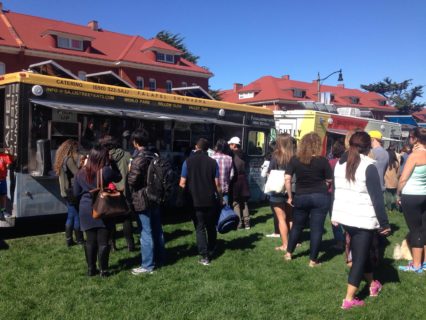Sajj Mediterranean makes sure hungry Californians have access to flavorful eats wherever they want them. “For us, the idea is very simple,” says Sajj CEO Zaid Ayoub. “We want to get to the customer anywhere the customer wants to enjoy our food.”
With corporate catering, roaming food trucks, and five stores in the San Francisco area (with more coming), Sajj Mediterranean keeps growing to make that enjoyment happen.
Grounded in Middle Eastern spices like turmeric, saffron, sumac, and cardamom, their comfort dishes of falafel, shawarma, and kebab satisfy vegetarians and meat-eaters alike. All marinades, dressings, entrees, and sides are made fresh in-house daily. Ingredients are available to keep those with dietary restrictions safe. And the team works with customers to determine whether buffet-style catering or on-site food truck service might best serve their particular event.
We got Zaid Ayoub on the line to find out how the Sajj Mediterranean team navigates such varying hospitality venues, and whether he suggests other catering restaurants take the truck plunge.
What makes the Sajj Mediterranean menu stand out amongst the crowd?
We serve the food at the ingredient level and we give the customers the ability to customize their meals.
For example, the kebabs are flavored with certain seasonings. We serve it with turmeric rice, or you can have it with arugula, spring mix, or baby kale. We have tahini sauce and spicy tahini sauce. There’s always spiced garbanzos, cauliflower, and eggplant. And then on the cold side, there are all kinds of pickled items, turnips, beets, avocado, feta cheese, and mint.
You could come every day and end up with a different combination. When we started, the idea was to do something exotic, something out of the norm, and something customizable, so every day you could have a different adventure.
For Sajj Mediterranean, which came first: brick-and-mortar restaurants, corporate catering, or the food trucks?
They came at the same time. We caught onto the food truck movement early on. Our food is traditional “street eats”. In the Middle East and in Europe, you grab the sandwich as your meal and eat on the sidewalk. The food truck movement allows our customers to get the food truck experience, wherever they are. We opened our first brick-and-mortar in Menlo Park with a commissary kitchen and started roaming all over the Bay Area with the truck.
 Is there a difference in menus or service style?
Is there a difference in menus or service style?
The store and catering serve the same way – basically buffet style. At the store, you pick what you want and we make it for you. In catering, we set everything up labeled with all allergens and nutrition facts, and the customer walks through and makes their plate or bowl. The difference is on the truck, where we have four or five pre-designed meals, curated.
Now, the base menu is the same, so from an operational perspective, the setup is the same. It’s just the way you assemble it and give it to the customer – that’s where the difference is.
Have you found one style to be particularly successful?
We have certain customers that get a truck in rotation every other week on a certain day, and that’s popular. Then, other customers order buffet catering for their departments. And others order individual meals for their corporate staff or meeting rooms. There’s demand for all.
Each channel has its own challenges and its own benefits. We manage all of that, and I think that’s what sets us apart – we’re really customer focused.
What are some of the challenges and benefits of owning food trucks?
A food truck is a great marketing tool for us. It’s a billboard for Sajj Mediterranean on the highway, going all over the place. But also, trucks have limitations. They are literally too many moving parts – tires, engines, traffic, weather, accidents – all that kind of stuff to worry about.
Also, there are a lot more trucks out there and the novelty of a food truck is no longer there, so people only want to go to trucks that offer really, really good food. So, it’s definitely a good business segment for us, but there is a level of saturation happening.

Taking this into consideration, what’s the key factor to food truck success, then?
It depends on your approach really. If you’re an owner-operator, and you like to cook, and you enjoy going out and procuring great food, cooking it, meeting customers, and providing them the best experience, then it’s a good life.
Our model is different in the sense that we are a bigger corporation and we have multiple channels, so obviously we run it lean and perfect: we’re very careful about maintenance, cleanliness, and health requirements. We look at it as an investment – as marketing and spreading our message.
What words of encouragement do you have for customers considering but tentative to try catering from your food trucks?
It depends on many parameters. but trucks are really cool. They’re kind of sexy. They’re exotic.
And words of warning?
One of our biggest issues is the weather. We’re lucky in California, where it’s nice most of the time. But if a client wants truck on January 10th and we look at the weather, we say, “Listen, it’s not going to be nice out. We’d love to bring it, but you’re not going to have a good turnout. People are going to be inside if it’s raining.” We work with them. Every requirement is different.
Article by ezcater













